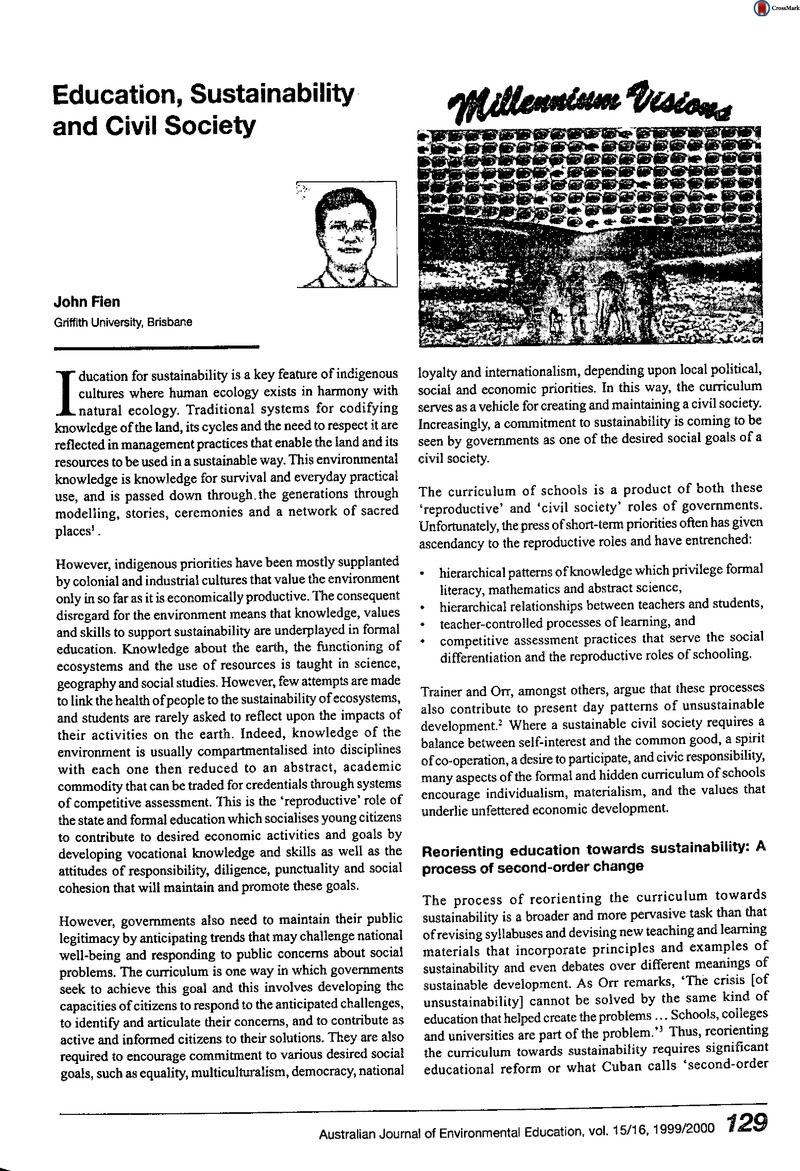Article contents
Education, Sustainability and Civil Society
Published online by Cambridge University Press: 23 June 2015
Abstract

- Type
- Other
- Information
- Copyright
- Copyright © Cambridge University Press 1999
References
Notes
1 See, for example, Ulluwishewa, Rohanna, Kaloko, Abdul Aziz and Maricar, Dy Hairuni Hj Mohamed 1997, Indigenous Knowledge and Environmental Education, unpublished paper presented at National Environmental Education Workshop, Universiti Brunei Darussalam, 06 Google Scholar.
2 See, for example, Trainer, T. 1990, ‘Towards an Ecological Philosophy of Education’, Discourse, vol. 10, no. 2, pp. 92–117 Google Scholar; Orr, D. 1992, Ecological Literacy: Education and the Transition to a Postmodern World, State University of New York Press, Albany Google Scholar; Smith, G. 1992, Education and the Environment: Learning to Live within Limits, State University of New York Press, Albany Google Scholar; Fien, J. ed. 1993, Environmental Education: A Pathway to Sustainability, Deakin University Press, Geelong Google Scholar; and Huckle, J. & Sterling, S., eds 1996, Education for Sustainability, Earthscan, London Google Scholar.
3 Orr, D. 1992, op. cit., p. 83.
4 Cuban, L. 1988, ‘A Fundamental Puzzle of School Reform’, Phi Delta Kappan, vol. 70, no. 5, pp. 341–344 Google Scholar.
5 Fullan, M. with Stiegelbauer, S. 1991, The New Meaning of Educational Change. Cassell Educational Limited, London, p. 21 Google Scholar. In relation to education for sustainability, Sterling calls this a ‘constructive’ approach to curriculum reform. See Sterling, S. 1996, ‘Developing a Strategy’, in Huckle, J. & Sterling, S., eds, Education for Sustainability, Earthscan, London Google Scholar.
6 Orr, D. 1992, op. cit., p. 84.
7 I am indebted to Soren Breking for the phrase ‘new generation of environmental education’. See Breiting, S. 1993, ‘A New Generation of Environmental Education: Focus on Democracy as Part of an Alternative Paradigm, in Mrazek, R., ed, Alternative Paradigms in Environmental Education Research, North American Association for Environmental Education, Troy, Ohio Google Scholar.
8 For a critique of ‘shaping responsible behaviour’ as a goal of environmental education, see Robottom, I. & Hart, R. 1995, ‘Behaviourist EE Research: Environmentalism and Individualism, Journal of Environmental Education, vol. 26, no. 2, pp. 5–9 CrossRefGoogle Scholar.
9 Jensen, B. B. & Schnack, K. 1997, ‘The Action Competence Approach in Environmental Education, Environmental Education Research, vol. 3, no. 2, pp. 163–178 CrossRefGoogle Scholar.
10 See, for example, Merchant, C. 1980, The Death of Nature: Women, Ecology, and the Scientific Revolution, Harper and Row, San Francisco Google Scholar; and Shiva, V. 1989, Staying Alive - Women, Ecology and Development, Zed Books, London Google Scholar.
11 Orr, D. 1994, Earth in Mind, State University of New York Press, Albany Google Scholar.
12 Berberet, W. G. 1989, Education for Sustainable Development. Globescope Pacific Conference, Los Angeles, p. 4 Google Scholar.
13 Jensen, B. B. & Schnack, K. 1997, op. cit.
14 Smyth, J. 1995, ‘Environment and Education: A View of a Changing Scene’, Environmental Education Research, vol. 1, no. 1 CrossRefGoogle Scholar.
15 See Greenall, A. 1981, ‘Environmental Education: A Case Study of National Curriculum Action’, Environmental Education and Information, vol. 1, no. 4, pp. 285–294 Google Scholar.
16 Fullan with Stiegelbauer 1991, op cit., p. 354.
17 Orr (1992) op. cit., p. 83.
- 2
- Cited by




